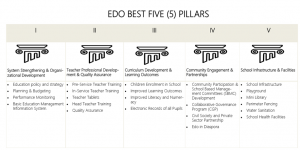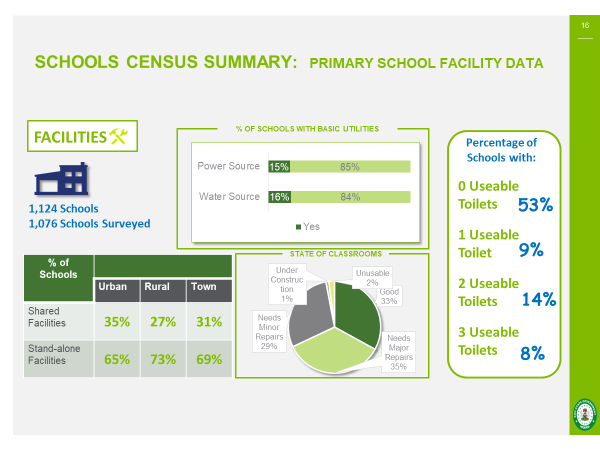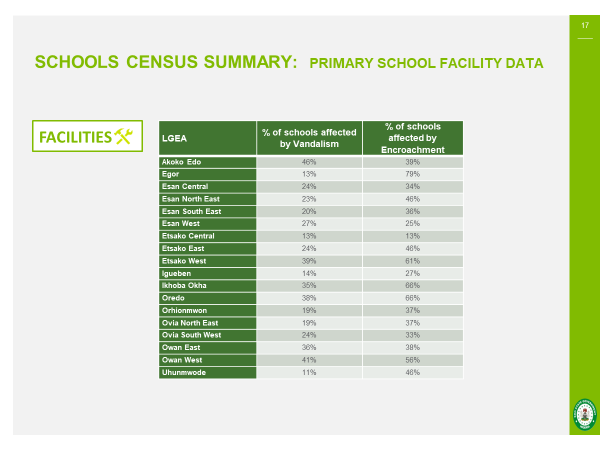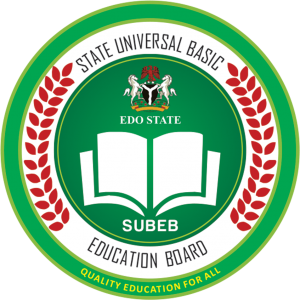Edo State adopted the Federal Government Universal Basic Education (UBE) programme in 2005 by enacting the State UBE Law which set up the State Universal Basic Education Board (SUBEB) and the Local Government Education Authorities (LGEAs). The free and compulsory education programme is intended to provide every child of school age resident in Edo State, regardless of state of origin, access to quality education from primary up to the completion of junior secondary school.
However, over the years the state has not been able to provide quality basic education to every child of school age. Lack of strategic planning, poor governance, mismanagement and ineffective deployment of resources are largely responsible. The State Ministry of Education (MoE), SUBEB and LGEAs need enhanced organisational capacities to minimize or eliminate undue political interference and wasteful allocation of resources, which tend to be at the detriment of service delivery.
Directly affected by this less than optimal system are children’s access to education, quality of teachers and learning achievements of pupils. There are shortages of necessary school infrastructure and facilities to support universal access, and quality teaching and learning. A sizeable number of school age children are out of school. Professional development and support of teachers are insufficient. The quality of teaching and learning in schools is poor. These have all resulted in restricted and inequitable access as well as unsatisfactory learning outcomes.
To improve the quality of education in the State the immediate past administration embarked on infrastructural upgrade of schools to create a more conducive learning environment through massive rehabilitation and reconstruction of schools and provision of school furniture throughout the state. The current administration is continuing with the upgrade of infrastructure utilizing the framework of the Minimum Standards for Basic Education in Nigeria, Edo SUBEB has developed an infrastructure plan in addition to definition of what constitutes a standard primary school, and classroom to ensure that the reforms of this current administration will be sustainable. However, this administration also recognizes that infrastructure alone is not enough and has decided to adopt a holistic approach to improving the quality of Basic Education provisions and Learning Outcomes.
Decrying the quality of Basic Education in Edo State, the Governor during his address at the Basic Education Repositioning workshop (24th-26th February, 2017) challenged all stakeholders to begin a serious reflection and realize the need to invest in Basic Education to reverse the current trend, through joint commitment of all stakeholders. He is committed to using available financial, technological, and human resources to provide inclusive and qualitative Basic Education for all children in Edo State, in collaboration with all stakeholders. Specifically, he raised the following as questions that need to be urgently addressed:
- How do we attract, retain, and motivate teachers in the State?
- How do we evenly distribute teachers within the urban and rural areas?
- What is the best technology available for Basic Education and how do we introduce these into our schools?
- How do we re-train existing teachers?
- How do we partner with the private sector and donors?
- How do we ensure effective leadership of schools?
- How do we return civic values and patriotism into our schools?
A technical team was consituted to design the framework for reform of the basic education subsector, this led to the birthing of Edo BEST (Edo Basic Education Sector Transformation). Some of the activities carried out included the following high level bullet points;
2017
- Restructuring of SUBEB (mass transfer of old staff and recruitment of new staff)
- Statewide school census exercise
- SUBEB Staff capacity building and training
- Development of a three-year strategic workplan with measurable KPIs
- Hosting of a Basic Education Stakeholders’ Forum in July 2017, as a follow-up to the February 2017 strategic planning workshop on Basic Education in Edo state
2018
- A special Edo State Exco Session on Education with focus on Basic Education (January 27, 2018).
- Pupils’ assessment in literacy and numeracy covering urban and rural areas
- Teachers’ skills mapping and roll-out of Teacher Professional Development training
- Headmaster/Headmistress skills mapping and roll-out of school management training program
- Revamping of state’s SBMCs and PTAs
- Launch of Mothers’ Association with membership in each ward of the state
- Begin pilot-phase of the new method of technology driven teaching and learning in 300 schools across Edo state
- Launch annual school and LGEA report
- Incorporate BEMIS (Basic Education Management Information System) into the day to day management of basic education. All SUBEB headquarters staff now have official email and an account in BEMIS. Migration of data and records of teaching and non-teaching staff has begun. This will facilitate proper management, oversight and accountability of staff.
Edo BEST (Edo Basic Education Sector Transformation)
Programme Objectives:
- Enhance the quality of Basic Education provision anchored on new technologies and the developmental objectives of Edo State and Nigeria.
- Ensure all children of basic school age in Edo State are enrolled in school, actively participating and achieving set learning benchmarks and outcomes.
- Revamp basic education management and delivery to make Edo State children highly knowledgeable, competent, skilful, morally sound and globally competitive.
Programme Strategies.
- Develop and use evidence-based and result-focused planning, budgeting and sector performance monitoring to drive basic education service delivery.
- Adopt an integrated approach to school improvement to ensure a balanced attention to, and coordination of all necessary inputs and interventions in basic education for synergy and improved results.
- Strengthen the capacity of the Ministry of Education, Universal Basic Education Board (SUBEB) and LGEAs to be more efficient, effective, responsive and accountable through institutional and organisational capacity development.
- Adapt and domesticate the national basic education curriculum to suite the specificities of Edo State and its development goals and objectives.
- Establish and sustain an efficient and effective teacher recruitment, deployment and professional development system that will ensure the availability of adequate competent and highly motivated headteachers and teachers in the state.
- Evolve and sustain strong and dynamic partnerships and coalition of stakeholders, including government, communities, the civil society, and international development partners to promote inclusive quality basic education provision.
- Strengthen and enhance the capacity of school-based management communities (SBMCs) for effective community participation and support to basic school improvement and quality teaching and learning.
- Revamp education Quality Assurance (QA) to ensure that schools attain and sustain set standards in management, infrastructure, facilities, teaching and pupils’ learning outcomes.
- Establish and sustain a functional Basic Education Management Information System (BEMIS} for the prompt availability of adequate credible and reliable data for planning, administration, advocacy and monitoring and evaluation.
Programme Scope and Pillars:
Edo BEST will be strategically planned and implemented with a 2017-2019 Basic Education Strategic and synchronized annual work plans of the Ministry of Education, SUBEB and LGEAs. The programme is structured and organized into five intervention areas identified as Pillars.
The Pillars
For effective launch of Edo BEST, it was important to gather both empirical and anecdotal data, thus, in November 2017, a statewide enumeration exercise was conducted and below is a summary of the scope of work:


- 1,400+ Public schools surveyed (both primary and secondary)
- Mobile technology enabled for efficient data gathering
- 120 question survey administered at each school
- Completed in six (6) weeks
- Executed by a team of 150 personnel, leveraging technology.

The results of the enumeration exercise further buttressed H.E. Governor Obaseki’s intention to focus first on revamping primary education considering the paucity of funds to go with a phased roll-out approach, starting with primary and then moving on to JSS.
The enumeration exercise included a count of pupils and teachers as well as a thorough inventory of facilities. Below are some highlights of data analyzed.
It was also discovered that a good number of our schools are being vandalized and burglarized. To curb this menace, Edo SUBEB is now moving towards using affordable and sustainable materials that are durable and have little or no second-hand value. We are thus replacing aluminum windows (which are highly sought after) with iron windows and doors.
In light of the foregoing narrative, it is more cost efficient and sustainable for Edo SUBEB to concentrate in the short term restoring quality in primary schools as this is the foundation of any education system. In this regard, the bulk of the funds for the 3rd and 4th quarter 2014, 1-4th quarter 2015 and 1st quarter 2016 are focused majorly on the renovation, construction and procurement of furniture for primary schools.
Construction/Renovation of 300 Schools:
- To provide furniture in all Primary 1 to Primary 3 classrooms. And provide furniture in all classrooms for at least 50% of primary schools by the end of the year
- Renovate 1/3 of our schools in the first quarter of 2018. This renovation will include, replacing broken doors and stolen windows with iron doors and windows
- Renovating dilapidated floors using terrazzo
- Construct a new Etete Primary School because the old school was demolished, and pupils temporarily relocated as the old school was under high tension wires.
- Majority of the 300 schools selected have fence, perimeter fence will be constructed for those without a fence. Fencing has become necessary to protect pupils and safeguard school properties from vandalism and theft.
Furniture
- While majority of the budget for furniture has been earmarked for primary schools, however, provision has been made to supply some furniture to Junior Secondary Schools. This is considered a palliative measure until the reform program rolls into Junior Secondary School. It is noteworthy to state here that beginning in the new academic year, some JSS schools will be added to the Edo BEST pilot program for integrating technology with teaching and learning.
Playground
- In Edo SUBEB’s definition of a standard primary school, toilet, water, playground, etc. are some of the must-have facilities. In this regard, affordable yet durable, playsets will be distributed to schools.
BEMIS (Basic Education Management Information System)
- Technology is key. We will need to deploy laptops to the 18 Education Secretaries. And additional desktops to their respective offices. Training them to master the use of BEMIS
Consultants
- Monitoring and evaluation is key to the success of the renovation and construction of our schools. An analysis of previous interventions shows that there is a lack of uniformity in the standard of work and materials used, which meant that some schools were already deteriorating less than 5 years after renovation/construction. To stem this, the plan is to properly manage the construction/renovation process by hiring the services of a qualified firm for oversight and supervision of all worksites in such a way as to close all loopholes for sub-standard work. Given the recent restructuring of Edo SUBEB, the firm would also assist in the revamping of our Projects Department and ensure that the old staff SUBEB staff in the department plus the newly recruited engineers are properly trained and empowered to carry on the work. In this regard, we are going against the norm to request permission to use more money from the matching grant to fund consulting and monitoring as we believe strongly that this upfront investment will save Edo state millions later in uncompleted or sub-standard construction work.
Mini Libraries
- Over the years, it has been difficult to provide libraries for public schools. Beginning this year, Edo SUBEB is outfitting each class with a mini-library (a shelf of books) to be managed by the pupils in the class who will serve as class librarians on a rotational basis. This will not only foster a reading culture among pupils, it will also teach them responsibility and how to care for public property.
Finally, beginning in the third term (April 2018), Edo SUBEB is piloting a new method of teaching and learning that integrates technology. Every teacher in the 300 pilot schools will have a tablet and, in this tablet, they can access their lesson note, take pupil attendance- detailed information about each pupil in the class, including parent/guardian information, etc. This program will be most effective in the pilot classes of primary 1 to primary 3 if Edo SUBEB is able to renovate the 300 schools and provide adequate furniture for all pupils. Beginning in September 2018, more schools will be added to this new program.
